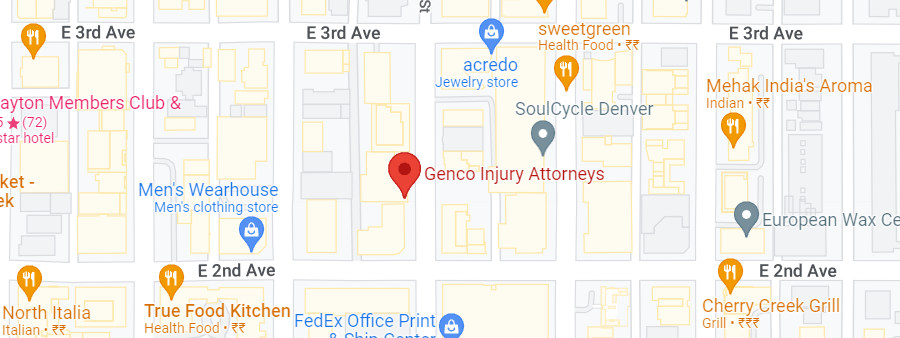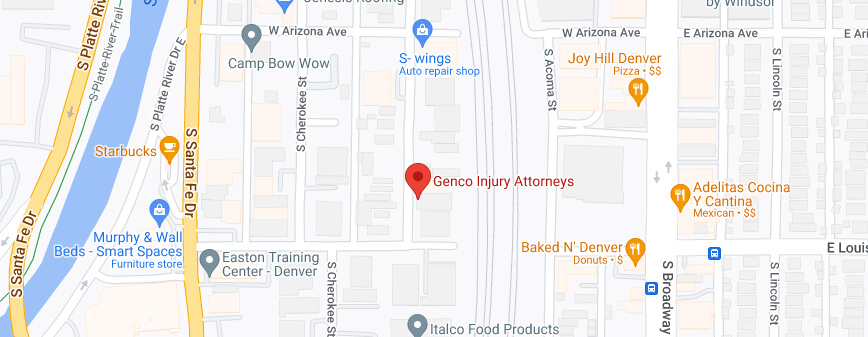Being in an accident with a truck can be a traumatic event. The larger the truck (and the faster it was going), the more impact it could have on other vehicles, especially smaller cars. Read on for what you need to know about proving a truck was liable for the accident.
Proving Negligence in Colorado
They must be proven negligent to prove that a truck driver or trucking company was responsible for the accident. Four aspects of negligence must be proven for the case to succeed.
Duty of care. This means that the truck driver or trucking company was responsible for operating safely in terms of actual driving but also for truck maintenance and driver training.
Breach of the duty of care. The duty of care was not followed in one way or another. This could be because the driver was driving while fatigued, under the influence of drugs or alcohol, distracted (using a cell phone, looking out the passenger window), breaking the laws of the road (speeding, running red lights, not using turn signals), or the trucking company didn’t use due diligence in maintaining trucks, hiring, or training drivers. These are just a few examples of what can be a breach of the duty of care.
Causation. This is the most challenging part to prove and another reason it’s valuable to work with an experienced accident attorney. There must be a direct link between the breach of the duty of care and the accident. For example, suppose the truck driver was speeding on a slippery road and could not slow down enough to avoid crashing into a car in front of them, which went off the road and injured the driver. In that case, the case may proceed based on the driver’s poor driving performance.
Damages. The accident caused the injured person monetary damages, whether in the form of out-of-pocket medical bills, lost wages, and pain and suffering compensation.
What Are the Statute of Limitations for Filing Claims After a Truck Accident?
The statute of limitations is a legal time frame in which someone can file claims in a personal injury case, such as an accident with a truck. In Colorado, that statute of limitations is three years from the accident date–in most cases. However, there are a few exceptions. For example, if injuries weren’t detected at first, the statute of limitations may be extended to account for that. Suppose the injured party has situations that prevent them from pursuing the case within three years (mental illness, bankruptcy, such severe physical injuries that they’re not able to function on a daily basis). In that case, the court may consider extending the deadline.
If you’re unsure of the timing of your claim, contact us for more information.
What Do Colorado’s Comparative Negligence Laws Mean My Bus Accident Case?
Colorado’s comparative negligence laws are a major factor when pursuing damages against a truck driver or trucking company. Colorado follows the modified comparative negligence model. That means that if someone is injured in an accident with a truck but is found to be at least 50% at fault for the accident, they’re not eligible to file for claims. If they’re found 49% or less at fault, they can still claim damages, but the percentage of fault will reduce the amount they receive. For example, if the injured person is deemed 30% at fault and is awarded $10,000, they’ll receive only $7,000 because of their level of fault.
This also means that truck drivers and companies will push hard to have the fault assessed onto the injured party, not the truck, so they can avoid paying damages. That’s why working with an experienced truck accident attorney on these types of cases is vital.
What Should I Do if I Was Injured in an Accident with a Truck?
First, if you’re physically able, get the name and contact information of the truck driver, along with information about who owns the truck and how to contact them. Don’t discuss the accident beyond that (see below for why). If there are eyewitnesses to the accident, get their names and contact info.
Following that, call the police to report the accident. Colorado requires police reports to be filed when there is property damage or bodily injury (or both). Even if it doesn’t appear to be a serious accident, it’s best to file the report right away.
The next step is to see a doctor, even if you feel fine. Many injuries don’t show symptoms at first. Left untreated, they can worsen and even become dangerous.
Then call Genco Injury Attorneys at 303-500-1376 for a free case evaluation. Truck accidents are complicated cases. Our team of experienced, knowledgeable personal injury attorneys can walk you through your case and help you understand what’s at stake and the likely outcomes.
There is something you shouldn’t do after an accident, and that’s enter into communications with the truck driver, the trucking company, their insurance company, or their lawyers. Their goal will be to get you to say something that can be interpreted as accepting more fault for the accident than you should so they can reduce the payout on their end. Or they may work to get you to accept a settlement that’s quite low, lower than you could be eligible for. Don’t respond, but forward any communication to your attorney.











